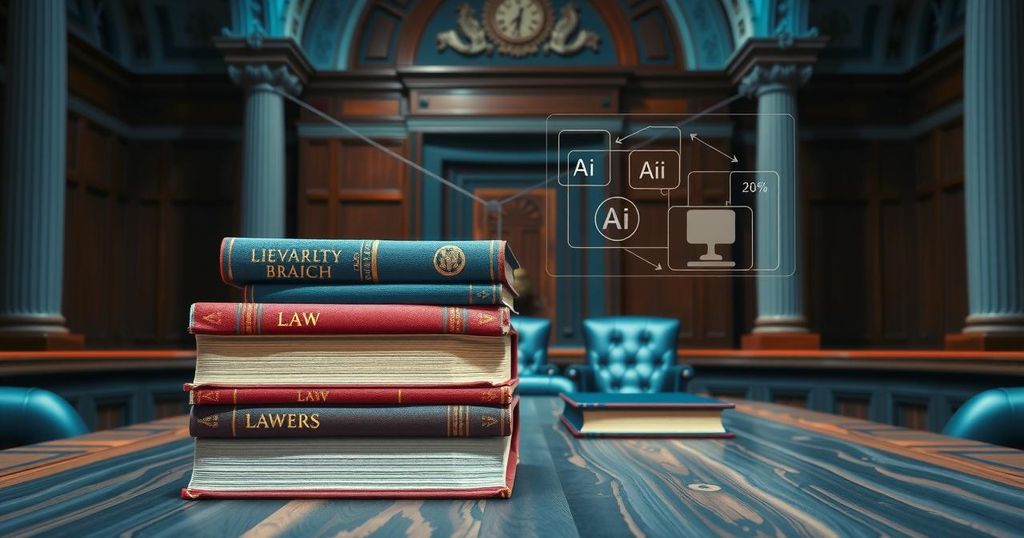Do AI Tools Deserve a Place in Canadian Courtrooms?
The use of AI in Canadian courtrooms presents both opportunities and challenges, highlighted by the case of Zhang v. Chen, where AI-generated fake citations were used in legal submissions. While courts seek regulation, the integration of AI raises concerns about accuracy, ethical obligations, and reliance on technology. Experts urge caution, promoting transparency and responsible use as the legal profession grapples with technology’s evolving role in justice.
In a groundbreaking case in December 2023, Vancouver lawyer Fraser MacLean faced unexpected hurdles when opposing counsel Chong Ke presented applications with fabricated case law, generated by AI tool ChatGPT. Initially appearing legitimate, these so-called hallucinations led to a reprimand for Ke and sparked widespread discussions on the pitfalls and potential benefits of AI in Canadian courtrooms, including concerns about fake evidence and case law.
This incident has ignited debates across Canadian legal circles about the implications of integrating AI into the legal process. Several other cases have since surfaced where unverified AI-generated citations were used, prompting courts to issue varied directives regarding AI usage, emphasizing the need for verification and declarations when AI tools assist in legal documentation.
While Alberta and Quebec have introduced a “human in the loop” requirement, guidelines remain inconsistently applied, and many doubt compliance among legal professionals. AI offers prospects for increased efficiency, with some lawyers utilizing generative AI for drafting and analyzing tasks, but caution is necessary. The potential for automation bias raises questions about technology’s trustworthiness in the legal domain.
Experts like Katie Szilagyi advocate for responsible AI use, urging legal professionals to remain aware of its limitations while upholding ethical standards, primarily concerning client confidentiality and data privacy. Benjamin Perrin highlights the societal benefits AI may offer but warns that integrating it into an already flawed system may exacerbate existing issues rather than resolve them.
The U.S. case Mata v. Avianca illustrates the risks of AI-generated submissions cluttered with fictitious case law, a trend replicated in various jurisdictions worldwide. Calls for stricter regulations, verification processes, and transparency mount as the public largely finds AI usage more acceptable than lawyers do themselves. Lawyers must be vigilant against relying too heavily on AI, ensuring it does not undermine their duty to clients.
Concerns challenge AI’s court admissibility, particularly regarding deepfake evidence and the authenticity of digital content. Justice Peter Lauwers believes establishing robust rules is vital to maintaining trust in the system. Although he recognizes potential AI applications for tasks like accident reconstruction, he cautions about its current inadequacies for core judicial functions.
Acknowledging that AI should never replace the judgment of judges, Chief Justice Richard Wagner emphasizes human oversight remains essential. Following incidents like Zhang v. Chen, which highlighted the very real risks of AI in legal work, MacLean contends that outright bans won’t solve issues. Instead, focusing on training and transparency can ensure responsible AI integration into legal practices. The overarching caution remains clear: the potential for miscarriages of justice looms large if these tools aren’t managed properly.
The conversation surrounding AI’s role in Canadian courtrooms is complex, marked by both potential and peril. Recent incidents underscore the necessity of vigilant verification of AI-generated content to prevent miscarriage of justice. While the technology promises efficiency improvements, it introduces significant risks that the legal community must navigate thoughtfully. As debates continue, expectations of transparency and responsibility in utilizing AI remain paramount for maintaining integrity within the legal system.
Original Source: toronto.citynews.ca




Post Comment